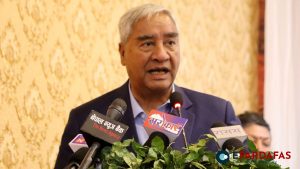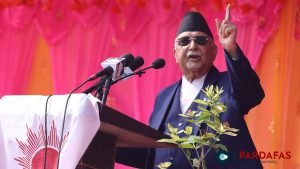
Gagan Thapa’s Ideological Victory and the Future of Nepali Congress

Gagan Thapa, a prominent figure within the Nepali Congress, has long been a force to be reckoned with in the country’s political landscape. From his days as a fiery student leader during the 2006 Movement to his recent ascension to the position of general secretary within the party, Thapa has consistently been at the forefront of political discourse in Nepal. However, it is his most recent ideological victory that has garnered widespread attention and sparked significant debate within the Nepali Congress and beyond.
During the Mahasamiti meeting held last month, Thapa successfully championed a proposal that struck at the heart of the party’s electoral strategy. He argued vehemently against the idea of forging alliances with major competitors in the upcoming elections, advocating instead for a more independent approach. This proposal, which was ultimately passed by the plenum, has sent shockwaves through Nepal’s political establishment and has had immediate repercussions on the governing Congress-Maoist alliance.
Prime Minister Pushpa Kamal Dahal’s decision to abandon the Congress in favor of a partnership with the CPN-UML has been widely attributed to Thapa’s influence and the ideological shift he represents within the Nepali Congress. The fallout from this decision has left the Congress party reeling, but Thapa himself remains undeterred in his convictions.
Thapa’s rise to prominence comes at a critical juncture for the Nepali Congress, with party president Sher Bahadur Deuba nearing the end of his tenure and no clear successor in sight. The party is also grappling with internal divisions, particularly within the influential Koirala clan, whose members have traditionally played a significant role in shaping the party’s direction. The emergence of Thapa as a leading voice within the party reflects not only his own political acumen but also the growing disillusionment with the old guard among the party rank and file.
Indeed, Thapa’s appeal lies in his ability to articulate a vision for the Nepali Congress that resonates with a new generation of leaders and supporters. He has positioned himself as a champion of the party’s founding principles and has been unafraid to challenge the status quo within the party hierarchy. His calls for greater independence and a return to the party’s ideological roots have struck a chord with many within the party who feel that it has lost its way in recent years.
Thapa’s proposal to eschew electoral alliances with ideological opponents has reignited debate within the Nepali Congress about the party’s future direction. At a time when Nepal’s traditional parties are losing ground to newer, more ideologically focused forces, Thapa’s stance represents a bold departure from the prevailing political wisdom. By advocating for a return to principled politics and a rejection of opportunistic alliances, Thapa is seeking to redefine the Nepali Congress as a party of conviction rather than convenience.
Of course, Thapa’s vision for the Nepali Congress is not without its challenges. The party faces significant obstacles in its quest to regain relevance in Nepal’s rapidly evolving political landscape. The rise of new political forces, including the Rastriya Swatantra Party, presents a formidable challenge to the Nepali Congress’s traditional dominance. Moreover, Thapa’s efforts to reshape the party’s electoral strategy may face resistance from entrenched interests within the party hierarchy.
Nevertheless, Thapa remains undeterred in his quest to rejuvenate the Nepali Congress and restore its position as a leading political force in Nepal. His conviction and determination have earned him widespread respect and admiration within the party and beyond. As Nepal prepares for the next chapter in its political history, Gagan Thapa stands as a symbol of hope and renewal for the Nepali Congress and the country as a whole.
In conclusion, Gagan Thapa’s ideological victory at the recent Mahasamiti meeting represents a significant turning point in the history of the Nepali Congress. His bold vision for the party’s future has sparked intense debate and reflection within the party and has positioned him as a leading voice for change. As Nepal navigates the challenges of a rapidly evolving political landscape, Thapa’s leadership offers a beacon of hope for the future of the Nepali Congress and the country as a whole.












Comments